2026年中考《英语》复习课件:专题二 第7讲 Units 10~12 (共51张PPT)
文档属性
| 名称 | 2026年中考《英语》复习课件:专题二 第7讲 Units 10~12 (共51张PPT) |  | |
| 格式 | pptx | ||
| 文件大小 | 331.9KB | ||
| 资源类型 | 教案 | ||
| 版本资源 | 人教新目标(Go for it)版 | ||
| 科目 | 英语 | ||
| 更新时间 | 2025-07-17 10:42:54 | ||
图片预览

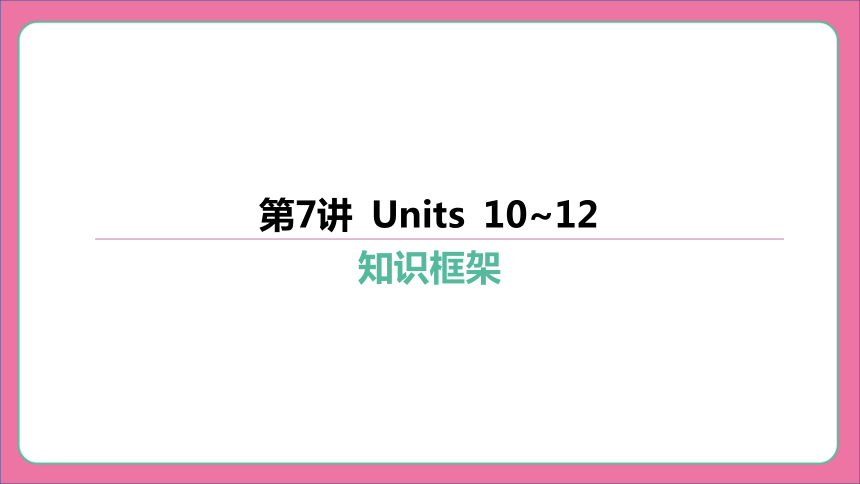
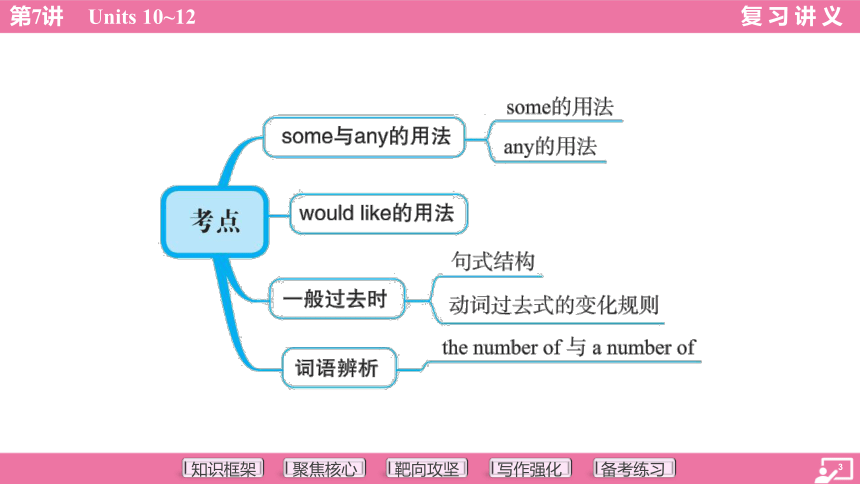
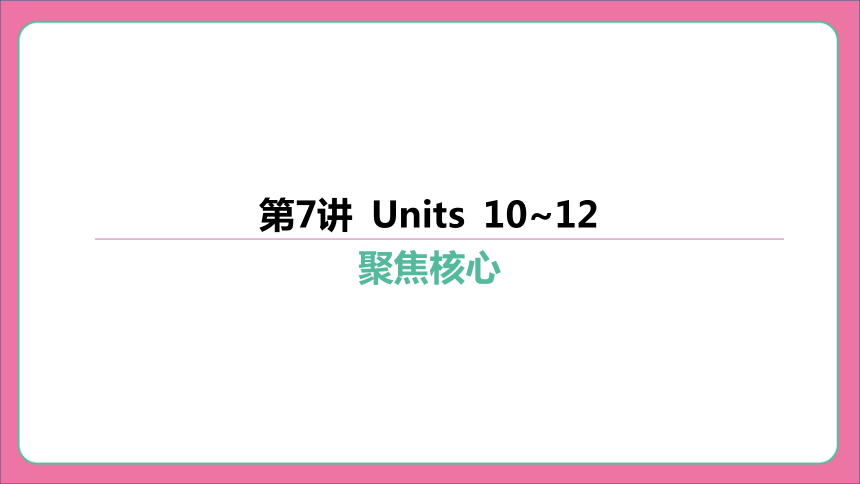
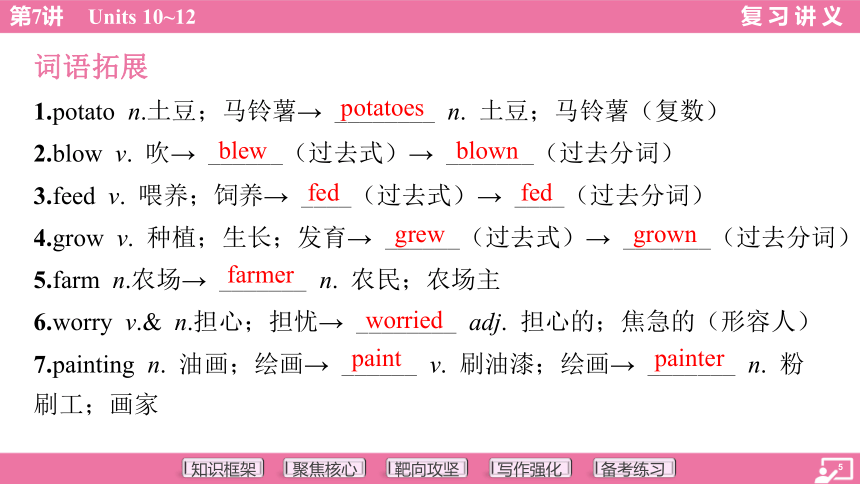
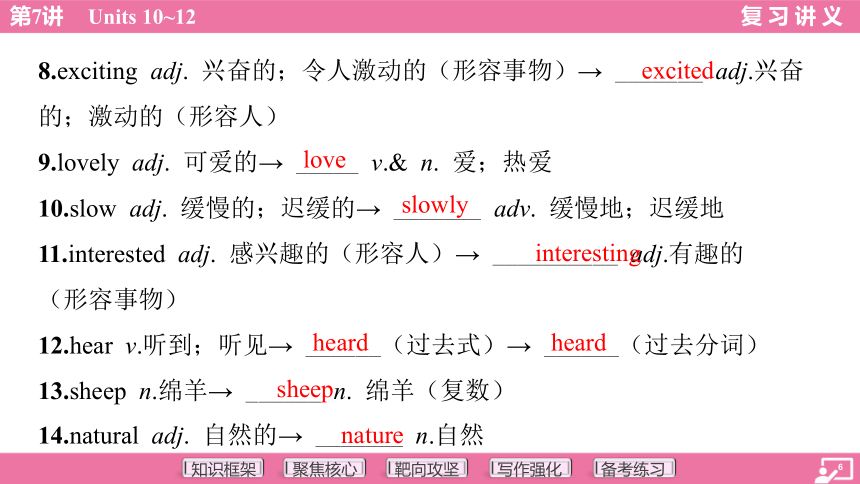
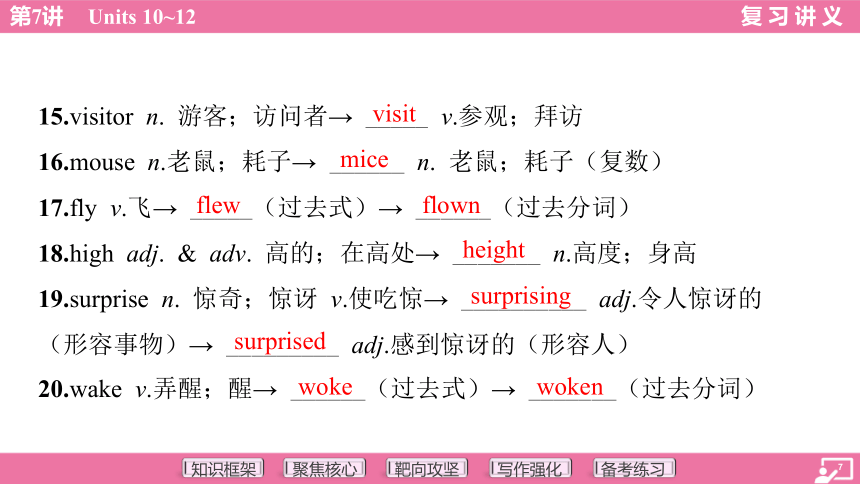
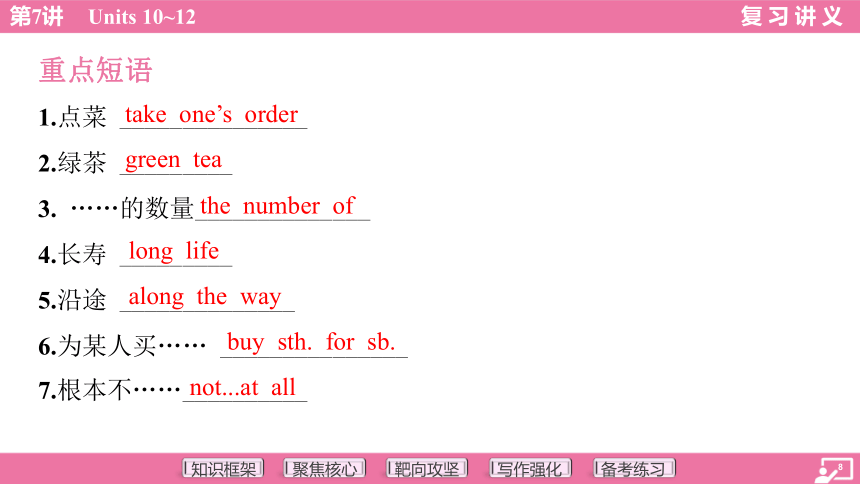
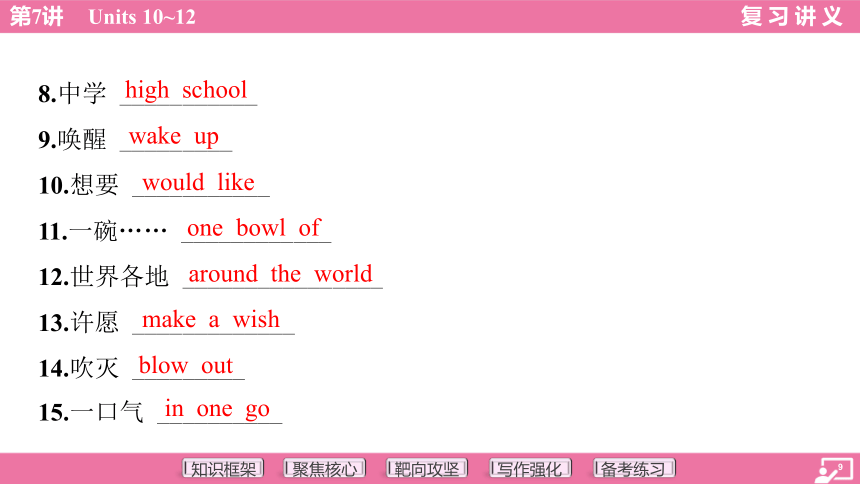
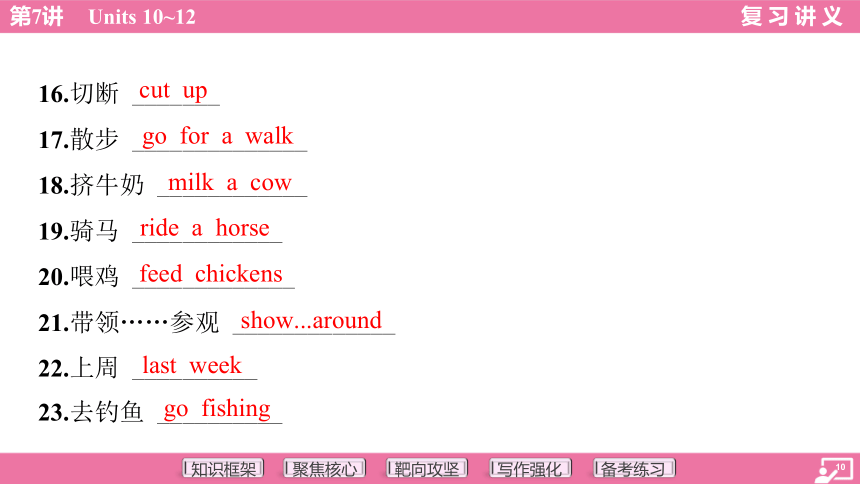
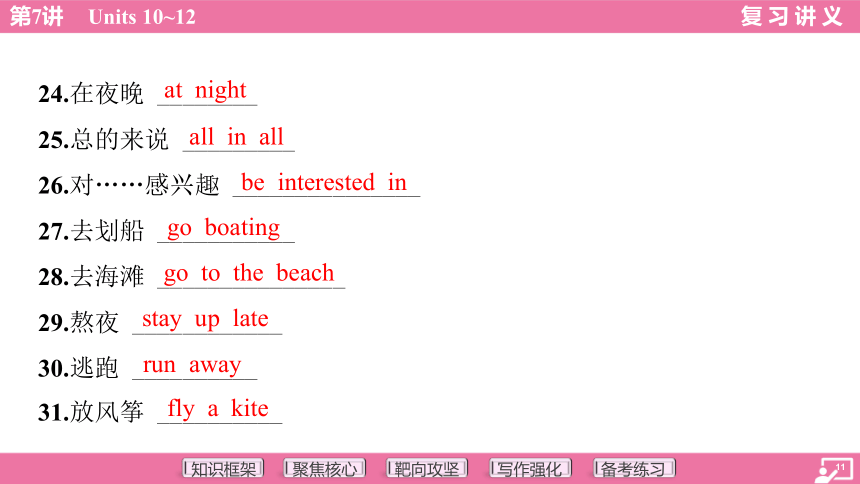
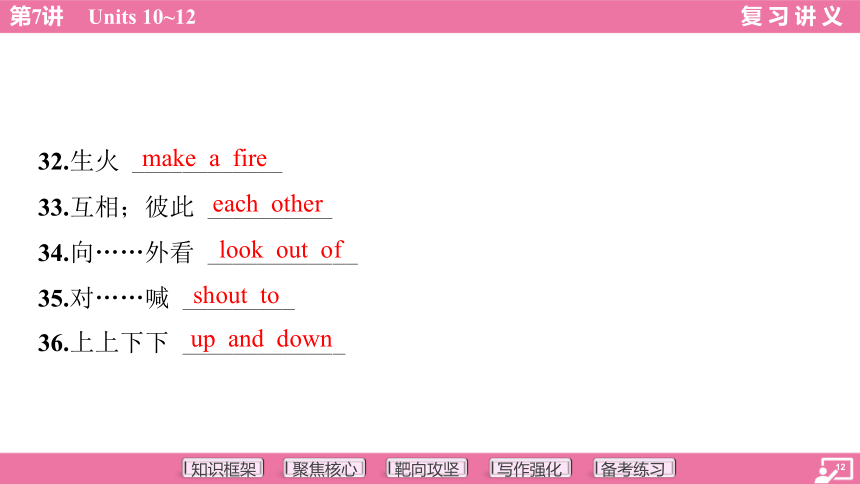
文档简介
(共51张PPT)
复 习 讲 义
第一篇 夯实根基
专题二 七年级下册
第7讲 Units 10~12
知识框架
第7讲 Units 10~12
聚焦核心
词语拓展
1.potato n.土豆;马铃薯→ ________ n. 土豆;马铃薯(复数)
2.blow v. 吹→ ______(过去式)→ _______(过去分词)
3.feed v. 喂养;饲养→ ____(过去式)→ ____(过去分词)
4.grow v. 种植;生长;发育→ ______(过去式)→ _______(过去分词)
5.farm n.农场→ _______ n. 农民;农场主
6.worry v.& n.担心;担忧→ ________ adj. 担心的;焦急的(形容人)
7.painting n. 油画;绘画→ ______ v. 刷油漆;绘画→ _______ n. 粉
刷工;画家
potatoes
blew
blown
fed
fed
grew
grown
farmer
worried
paint
painter
8.exciting adj. 兴奋的;令人激动的(形容事物)→ _______ adj.兴奋
的;激动的(形容人)
9.lovely adj. 可爱的→ _____ v.& n. 爱;热爱
10.slow adj. 缓慢的;迟缓的→ _______ adv. 缓慢地;迟缓地
11.interested adj. 感兴趣的(形容人)→ __________ adj.有趣的
(形容事物)
12.hear v.听到;听见→ ______(过去式)→ ______(过去分词)
13.sheep n.绵羊→ ______ n. 绵羊(复数)
14.natural adj. 自然的→ _______ n.自然
excited
love
slowly
interesting
heard
heard
sheep
nature
15.visitor n. 游客;访问者→ _____ v.参观;拜访
16.mouse n.老鼠;耗子→ ______ n. 老鼠;耗子(复数)
17.fly v.飞→ _____(过去式)→ ______(过去分词)
18.high adj. & adv. 高的;在高处→ _______ n.高度;身高
19.surprise n. 惊奇;惊讶 v.使吃惊→ __________ adj.令人惊讶的
(形容事物)→ _________ adj.感到惊讶的(形容人)
20.wake v.弄醒;醒→ ______(过去式)→ _______(过去分词)
visit
mice
flew
flown
height
surprising
surprised
woke
woken
重点短语
1.点菜 _______________
2.绿茶 _________
3. ……的数量______________
4.长寿 _________
5.沿途 ______________
6.为某人买…… _______________
7.根本不……__________
take one’s order
green tea
the number of
long life
along the way
buy sth. for sb.
not...at all
8.中学 ___________
9.唤醒 _________
10.想要 ___________
11.一碗…… ____________
12.世界各地 ________________
13.许愿 _____________
14.吹灭 _________
15.一口气 __________
high school
wake up
would like
one bowl of
around the world
make a wish
blow out
in one go
16.切断 _______
17.散步 ______________
18.挤牛奶 ____________
19.骑马 ____________
20.喂鸡 _____________
21.带领……参观 _____________
22.上周 __________
23.去钓鱼 __________
cut up
go for a walk
milk a cow
ride a horse
feed chickens
show...around
last week
go fishing
24.在夜晚 ________
25.总的来说 _________
26.对……感兴趣 _______________
27.去划船 ___________
28.去海滩 _______________
29.熬夜 ____________
30.逃跑 __________
31.放风筝 __________
at night
all in all
be interested in
go boating
go to the beach
stay up late
run away
fly a kite
32.生火 ____________
33.互相;彼此 __________
34.向……外看 ____________
35.对……喊 _________
36.上上下下 _____________
make a fire
each other
look out of
shout to
up and down
重点句型
Unit 10
1.—What would you like
—I’m not sure yet. (P55)
——你想要什么?
——我还没确定。
2.—What kind of noodles would you like
—I’d like beef noodles, please. (P56)
——你想要哪种面条?
——我想要牛肉面。
3.—What size would you like
—I’d like large bowl, please.(P57)
——你要多大碗的?
——我想要大碗的。
Unit 11
4.—How was your school trip
—It was great! (P63)
——你的学校郊游怎么样
——好极了!
5.—Did you go to the zoo
—No, I didn’t. I went to a farm. (P63)
——你去动物园了吗?
——不,没有。我去农场了。
6.—Did you see any cows
—Yes, I did. I saw quite a lot. (P63)
——你看到一些奶牛了吗?
——是的,我看到了。我看到了相当多的奶牛。
7.—Were the strawberries good
—Yes, they were./No, they weren’t. (P63)
——这些草莓好吃吗?
——是的,好吃。/不,不好吃。
Unit 12
8.—What did you do last weekend, Lucy
—Well, on Saturday morning, I played badminton. (P67)
——露西,上周末你做什么了?
——噢,星期六上午我打羽毛球了。
9.I worked as a guide at the Natural History Museum.(P68)
我在自然历史博物馆当导游。
10.They have a butterfly house with 200 kinds of butterflies.(P68)
他们有一个蝴蝶馆,里面有200种蝴蝶。
11.—Where did she go last weekend
—She went to a farm.(P69)
——上周末她去了哪里?
——她去了农场。
12.But I was so tired that I went to sleep early.(P71)
但是我太累了,所以早早就睡了。
第7讲 Units 10~12
靶向攻坚
考点1 some和any的用法。
1.some意为“一些,某些,某个”,可代替名词和形容词,常用于肯
定句,在句子中用作主语、宾语、定语。作定语时,它可以修饰复数可
数名词,也可以修饰不可数名词。
(1)用于肯定句。例如:
You can ask some boys to help you. 你可以叫些男孩来帮助你。
Please bring some water. 请拿些水来。
(2)some 用于疑问句时表示请求、邀请或希望得到肯定的回答。
例如:
Would you like some coffee 来点咖啡怎么样?
2.any意为“一些,任何”,可代替名词和形容词,常用于疑问句或否
定句,也可以用于条件状语从句。作定语时,它可以修饰复数可数名词
和不可数名词。
(1)用于疑问句或否定句。例如:
Are there any horses on the farm 农场里有马吗
There won’t be any trouble. 不会有任何麻烦。
(2)用于条件状语从句。例如:
If you have any questions, you can ask me. 如果你有什么问题,
你可以问我。
考点精练
1.I still have ________ orange juice in the fridge.( )
B
A.any B.some C.few
2.There isn’t ________ water in the bottle. Let’s go and get
some.( )
C
A.many B.some C.any
3.—Your tea smells great!
—It’s from China. Would you like ________ ( )
C
A.it B.this C.some
考点2 would like的用法。
would like意为“想要”,语气比较委婉。具体用法如下。
1.后接名词或代词,表示具体“要”某样东西。例如:
I would like a cup of tea. 我要一杯茶。
2.后接动词不定式(就是to do形式),表示意愿、喜爱,常用于有
礼貌地提出邀请、请求或建议。例如:
I would like to help you. 我愿意帮你。
3.would like sb. to do sth.意为“想要某人做某事”。例如:
I’d like you to meet them. 我想要你见他们。
4.“Would you like... ”意为“你(们)想要……吗?”,表示向对方
提出客气的、有礼貌的请求、邀请、希望或询问等。例如:
Would you like an orange 你想要个橘子吗?
注意:它的肯定回答多用“Yes, please./Yes, I’d (We’d) like
(love) to./Certainly./Yes, thank you.”等;否定回答常用“No,
thanks./No, thank you.”等。例如:
—Would you like something to drink 你要点喝的吗?
—Yes, thank you./No, thanks. 是的,谢谢你。/不要了,谢谢。
考点精练
1.—Would you like ________ camping with me
—I’d like to. But I’m busy ________ my homework.( )
B
A.to go; to do B.to go; doing C.going; to do
2.—Would you like to show me around your school
—________( )
B
A.That’s all right. B.Yes, I’d love to. C.Thanks a lot.
考点3 一般过去时。
一般过去时表示过去某个特定时间发生的动作或存在的状态。一般
过去时的句子中通常有yesterday, last year, in 1976, a few months ago
等表示过去的时间状语。一般过去时也可以表示过去某一段时间内经常
或反复发生的动作,通常与often, usually, seldom等表示频率的副词连用。
1.一般过去时的句式结构。
(1)肯定句:主语+动词的过去式+其他. 例如:
I went to the zoo last Sunday. 上个星期日我去了动物园。
(2)否定句:主语+was/were + not +其他. 或者:主语+didn’t+动
词原形+其他. 例如:
He wasn’t in the office just now. 他刚才不在办公室。
We didn’t go to the cinema last night. 昨晚我们没有去电影院。
(3)一般疑问句:Did+主语+动词原形+其他?或者:Was/Were+
主语+其他?例如:
Did you have a good time last weekend 上周末你们玩得开心吗?
Were you at school yesterday 昨天你在学校吗?
(4)特殊疑问句:
①疑问词在句中不作主语时:疑问词+did+主语+动词原形+其他?
或者:疑问词+was/were+主语+其他?例如:
Where did you go last night 昨晚你去哪儿了?
How was your weekend 你的周末过得怎样?
②疑问词在句中作主语时: 疑问词+动词的过去式+其他? 或者:
疑问词+was/were+表语+其他? 例如:
Who cleaned the classroom 谁打扫了教室?
Who was here just now 刚才谁在这里?
2.动词的过去式的变化规则。
规 则 例 词
一般在动词词尾加-ed work—worked
help—helped
以e结尾的动词在词尾加-d live—lived
hope—hoped
“辅音字母+y”结尾的动词, 先变y为i再加-ed study—studied
carry—carried
末尾只有一个辅音字母的重读闭 音节的动词, 先双写这个辅音字 母, 再加-ed stop—stopped
plan—planned
3.还有相当一部分动词的过去式是不规则变化的。
do—did go—went
see—saw come—came
have—had say—said
buy—bought begin—began
考点精练
1.—Where were you last Saturday
—I ________ in the Capital Museum.( )
C
A.am B.will be C.was
2.—Where ________ you ________ the new phone
—In a shopping mall near here.( )
B
A.have; bought B.did; buy C.are; bought
考点4 the number of和a number of的用法区别。
短 语 词义 区 别 例 句
the number of ……的 数目 作主语时, 谓语用单数 The number of the students in our school is five thousand. 我们学校的学生数目是5,000人。
a number of 许多 修饰可数名 词,作主语 时,谓语用 复数 A number of foreigners come to China on a visit every year.每年有大量的外国人来中国参观。
考点精练
—How many boys are there in your class
—________ them ________ twenty-five.( )
C
A.A number of; are
B.The number of; are
C.The number of; is
第7讲 Units 10~12
写作强化
主题:活动经历
写作强化
假如你是Lily,上周六你和你的朋友Rose去参观了蝴蝶馆。请你根
据下面的内容提示,写一篇题为“A Trip to the Butterfly House”的英语
短文,为你下周在英语角上的发言做准备。
内容提示:1.出发时间;2.交通方式;3.活动内容;4.返程时间及感受
写作要求:80词左右。开头已给出,不计入总词数。
A Trip to the Butterfly House
Hey,I’m Lily._______________________________________________
______________________________________________________________
______________________________________________________________
______________________________________________________________
______________________________________________________________
______________________________________________________________
______________________________________________________________
______________________________________________________________
Last Saturday I visited the Butterfly House with my
friend Rose. We started at 9:00 am. We went there by bus.
In the Butterfly House, we saw many kinds of butterflies. They came
from different countries and they were all very beautiful. We took
quite a lot of photos of them. The guide told us some stories about
butterflies. They were very interesting. We learned a lot about
butterflies and really had a good time in the Butterfly House.
We got back at 5:00 pm. We were tired but happy and excited.
审题谋篇
审主题 一次活动经历
审人称 第一人称
审时态 一般过去时
审要点 ①出发时间 ②交通方式 ③活动内容 ④返程时间及感受
审结构 开篇:点明活动时间、地点、同行人和交通方式
中间:介绍参观的内容
结尾:返程时间及感受
常用词句 [词语]
all/many kinds of, come from, take photos
[句型]
①Last Saturday I visited the Butterfly House with my friend Rose.
②We learned a lot about butterflies and really had a good time in the Butterfly House.
续表
第7讲 Units 10~12
备考练习
一、单项选择。
1.They took a train to Fuzhou ________ the morning of July
24th.( )
C
A.at B.from C.on
2.—Excuse me. I want dumplings ________ mutton. How much are
they
—Thirty yuan ________ a bowl.( )
B
A.on; of B.with; for C.on; for
3.—Why don’t you buy that sweater
—It’s too ________. I don’t have so much money.( )
A
A.expensive B.old C.funny
4.—Are there ________ restaurants in the neighborhood
—Yes, there are ________ on Center Street.( )
C
A.some; any B.some; some C.any; some
5.Don’t ________ your brother. He slept five minutes ago.( )
B
A.blow out B.wake up C.put up
6.—Tim, here are two ________ for you.
—Oh, there is too much ________ in the salad.( )
C
A.salad; onion B.salad; onions C.salads; onion
7.—________ Sam in the library just now
—Yes. And he ________ still there now.( )
C
A.Is; is B.Was; was C.Was; is
8.—Would you like ________ skating with me
—Sure. I enjoy ________ very much.( )
B
A.going; skating B.to go; skating C.going; to skate
9.The meat is too big for the cat to eat. You need to ________.( )
C
A.take it out B.blow it out C.cut it up
10.Helen and her parents ________ in Beijing. They ________ there
last summer.( )
A
A.live; moved B.lived; move C.live; move
二、用括号内所给单词的正确形式填空。
1.The little boy is only eight, but he can speak four different
__________(language).
2.My clock didn’t work this morning. ________(luck), I didn’t
arrive late for school.
3.Tina couldn’t get to sleep, so she tried counting ______(sheep).
4.We went _________(camp) with Mr. Dean and there he taught us
how to live in the wild.
languages
Luckily
sheep
camping
5.Scott __________ (milk)a cow on the farm right now. He is
having so much fun.
6.Two-month-old _______(baby) can sleep for 16 to 18 hours a day.
7.Rice usually _______ (grow)in warm places.
8.I _____(take) a bus to work yesterday.
9.Becky is a _______ (love)girl. Everyone in her class likes her.
10.Would you like ________(play)football with us after school
is milking
babies
grows
took
lovely
to play
三、从方框中选择恰当的单词,并用其正确形式填空。每个单
词只能用一次。
go milked draw visited played
by studied be exciting had
My family was busy last Saturday. My parents 1.______ shopping
in the morning. My brother 2._______ basketball with his friends. My
sister Gina was at home and 3.______ pictures. I 4._______ math. In
the afternoon, we 5._______ our grandparents.
went
played
drew
studied
visited
They 6.______ in the countryside. We got there 7.____ bus. We were
happy to see them. They 8._____ a farm. My brother 9._______ a
cow and my sister fed chickens with me. My mother took some
photos for us. We had so much fun. It’s really an 10.________ day!
were
by
had
milked
exciting
go milked draw visited played
by studied be exciting had
四、情景交际。
根据对话内容,从方框中选择恰当的选项补全对话,其中有一项多余。
A: Can I help you
B: Yes, please. 1.___
A: Sure. Here you are.
B: 2.___
C: I want something to drink first.
B: So what about orange juice
C: 3.___ I’d like some apple juice. What about you
B
D
A
go milked draw visited played
by studied be exciting had
B: I’d like a glass of milk. 4.___
C: I want a small bowl of dumplings.
B: And I want to eat beef noodles. So we want a glass of apple juice,
a glass of milk, a small bowl of dumplings and a large bowl of beef
noodles.
A: I see. 5.___
B & C: OK. Thank you.
C
E
go milked draw visited played
by studied be exciting had
A. No, thanks.
B. May I see the menu first
C. What do you want to eat
D. What do you want, Lucy
E. Wait a minute, please.
F. Do you want to eat noodles
复 习 讲 义
第一篇 夯实根基
专题二 七年级下册
第7讲 Units 10~12
知识框架
第7讲 Units 10~12
聚焦核心
词语拓展
1.potato n.土豆;马铃薯→ ________ n. 土豆;马铃薯(复数)
2.blow v. 吹→ ______(过去式)→ _______(过去分词)
3.feed v. 喂养;饲养→ ____(过去式)→ ____(过去分词)
4.grow v. 种植;生长;发育→ ______(过去式)→ _______(过去分词)
5.farm n.农场→ _______ n. 农民;农场主
6.worry v.& n.担心;担忧→ ________ adj. 担心的;焦急的(形容人)
7.painting n. 油画;绘画→ ______ v. 刷油漆;绘画→ _______ n. 粉
刷工;画家
potatoes
blew
blown
fed
fed
grew
grown
farmer
worried
paint
painter
8.exciting adj. 兴奋的;令人激动的(形容事物)→ _______ adj.兴奋
的;激动的(形容人)
9.lovely adj. 可爱的→ _____ v.& n. 爱;热爱
10.slow adj. 缓慢的;迟缓的→ _______ adv. 缓慢地;迟缓地
11.interested adj. 感兴趣的(形容人)→ __________ adj.有趣的
(形容事物)
12.hear v.听到;听见→ ______(过去式)→ ______(过去分词)
13.sheep n.绵羊→ ______ n. 绵羊(复数)
14.natural adj. 自然的→ _______ n.自然
excited
love
slowly
interesting
heard
heard
sheep
nature
15.visitor n. 游客;访问者→ _____ v.参观;拜访
16.mouse n.老鼠;耗子→ ______ n. 老鼠;耗子(复数)
17.fly v.飞→ _____(过去式)→ ______(过去分词)
18.high adj. & adv. 高的;在高处→ _______ n.高度;身高
19.surprise n. 惊奇;惊讶 v.使吃惊→ __________ adj.令人惊讶的
(形容事物)→ _________ adj.感到惊讶的(形容人)
20.wake v.弄醒;醒→ ______(过去式)→ _______(过去分词)
visit
mice
flew
flown
height
surprising
surprised
woke
woken
重点短语
1.点菜 _______________
2.绿茶 _________
3. ……的数量______________
4.长寿 _________
5.沿途 ______________
6.为某人买…… _______________
7.根本不……__________
take one’s order
green tea
the number of
long life
along the way
buy sth. for sb.
not...at all
8.中学 ___________
9.唤醒 _________
10.想要 ___________
11.一碗…… ____________
12.世界各地 ________________
13.许愿 _____________
14.吹灭 _________
15.一口气 __________
high school
wake up
would like
one bowl of
around the world
make a wish
blow out
in one go
16.切断 _______
17.散步 ______________
18.挤牛奶 ____________
19.骑马 ____________
20.喂鸡 _____________
21.带领……参观 _____________
22.上周 __________
23.去钓鱼 __________
cut up
go for a walk
milk a cow
ride a horse
feed chickens
show...around
last week
go fishing
24.在夜晚 ________
25.总的来说 _________
26.对……感兴趣 _______________
27.去划船 ___________
28.去海滩 _______________
29.熬夜 ____________
30.逃跑 __________
31.放风筝 __________
at night
all in all
be interested in
go boating
go to the beach
stay up late
run away
fly a kite
32.生火 ____________
33.互相;彼此 __________
34.向……外看 ____________
35.对……喊 _________
36.上上下下 _____________
make a fire
each other
look out of
shout to
up and down
重点句型
Unit 10
1.—What would you like
—I’m not sure yet. (P55)
——你想要什么?
——我还没确定。
2.—What kind of noodles would you like
—I’d like beef noodles, please. (P56)
——你想要哪种面条?
——我想要牛肉面。
3.—What size would you like
—I’d like large bowl, please.(P57)
——你要多大碗的?
——我想要大碗的。
Unit 11
4.—How was your school trip
—It was great! (P63)
——你的学校郊游怎么样
——好极了!
5.—Did you go to the zoo
—No, I didn’t. I went to a farm. (P63)
——你去动物园了吗?
——不,没有。我去农场了。
6.—Did you see any cows
—Yes, I did. I saw quite a lot. (P63)
——你看到一些奶牛了吗?
——是的,我看到了。我看到了相当多的奶牛。
7.—Were the strawberries good
—Yes, they were./No, they weren’t. (P63)
——这些草莓好吃吗?
——是的,好吃。/不,不好吃。
Unit 12
8.—What did you do last weekend, Lucy
—Well, on Saturday morning, I played badminton. (P67)
——露西,上周末你做什么了?
——噢,星期六上午我打羽毛球了。
9.I worked as a guide at the Natural History Museum.(P68)
我在自然历史博物馆当导游。
10.They have a butterfly house with 200 kinds of butterflies.(P68)
他们有一个蝴蝶馆,里面有200种蝴蝶。
11.—Where did she go last weekend
—She went to a farm.(P69)
——上周末她去了哪里?
——她去了农场。
12.But I was so tired that I went to sleep early.(P71)
但是我太累了,所以早早就睡了。
第7讲 Units 10~12
靶向攻坚
考点1 some和any的用法。
1.some意为“一些,某些,某个”,可代替名词和形容词,常用于肯
定句,在句子中用作主语、宾语、定语。作定语时,它可以修饰复数可
数名词,也可以修饰不可数名词。
(1)用于肯定句。例如:
You can ask some boys to help you. 你可以叫些男孩来帮助你。
Please bring some water. 请拿些水来。
(2)some 用于疑问句时表示请求、邀请或希望得到肯定的回答。
例如:
Would you like some coffee 来点咖啡怎么样?
2.any意为“一些,任何”,可代替名词和形容词,常用于疑问句或否
定句,也可以用于条件状语从句。作定语时,它可以修饰复数可数名词
和不可数名词。
(1)用于疑问句或否定句。例如:
Are there any horses on the farm 农场里有马吗
There won’t be any trouble. 不会有任何麻烦。
(2)用于条件状语从句。例如:
If you have any questions, you can ask me. 如果你有什么问题,
你可以问我。
考点精练
1.I still have ________ orange juice in the fridge.( )
B
A.any B.some C.few
2.There isn’t ________ water in the bottle. Let’s go and get
some.( )
C
A.many B.some C.any
3.—Your tea smells great!
—It’s from China. Would you like ________ ( )
C
A.it B.this C.some
考点2 would like的用法。
would like意为“想要”,语气比较委婉。具体用法如下。
1.后接名词或代词,表示具体“要”某样东西。例如:
I would like a cup of tea. 我要一杯茶。
2.后接动词不定式(就是to do形式),表示意愿、喜爱,常用于有
礼貌地提出邀请、请求或建议。例如:
I would like to help you. 我愿意帮你。
3.would like sb. to do sth.意为“想要某人做某事”。例如:
I’d like you to meet them. 我想要你见他们。
4.“Would you like... ”意为“你(们)想要……吗?”,表示向对方
提出客气的、有礼貌的请求、邀请、希望或询问等。例如:
Would you like an orange 你想要个橘子吗?
注意:它的肯定回答多用“Yes, please./Yes, I’d (We’d) like
(love) to./Certainly./Yes, thank you.”等;否定回答常用“No,
thanks./No, thank you.”等。例如:
—Would you like something to drink 你要点喝的吗?
—Yes, thank you./No, thanks. 是的,谢谢你。/不要了,谢谢。
考点精练
1.—Would you like ________ camping with me
—I’d like to. But I’m busy ________ my homework.( )
B
A.to go; to do B.to go; doing C.going; to do
2.—Would you like to show me around your school
—________( )
B
A.That’s all right. B.Yes, I’d love to. C.Thanks a lot.
考点3 一般过去时。
一般过去时表示过去某个特定时间发生的动作或存在的状态。一般
过去时的句子中通常有yesterday, last year, in 1976, a few months ago
等表示过去的时间状语。一般过去时也可以表示过去某一段时间内经常
或反复发生的动作,通常与often, usually, seldom等表示频率的副词连用。
1.一般过去时的句式结构。
(1)肯定句:主语+动词的过去式+其他. 例如:
I went to the zoo last Sunday. 上个星期日我去了动物园。
(2)否定句:主语+was/were + not +其他. 或者:主语+didn’t+动
词原形+其他. 例如:
He wasn’t in the office just now. 他刚才不在办公室。
We didn’t go to the cinema last night. 昨晚我们没有去电影院。
(3)一般疑问句:Did+主语+动词原形+其他?或者:Was/Were+
主语+其他?例如:
Did you have a good time last weekend 上周末你们玩得开心吗?
Were you at school yesterday 昨天你在学校吗?
(4)特殊疑问句:
①疑问词在句中不作主语时:疑问词+did+主语+动词原形+其他?
或者:疑问词+was/were+主语+其他?例如:
Where did you go last night 昨晚你去哪儿了?
How was your weekend 你的周末过得怎样?
②疑问词在句中作主语时: 疑问词+动词的过去式+其他? 或者:
疑问词+was/were+表语+其他? 例如:
Who cleaned the classroom 谁打扫了教室?
Who was here just now 刚才谁在这里?
2.动词的过去式的变化规则。
规 则 例 词
一般在动词词尾加-ed work—worked
help—helped
以e结尾的动词在词尾加-d live—lived
hope—hoped
“辅音字母+y”结尾的动词, 先变y为i再加-ed study—studied
carry—carried
末尾只有一个辅音字母的重读闭 音节的动词, 先双写这个辅音字 母, 再加-ed stop—stopped
plan—planned
3.还有相当一部分动词的过去式是不规则变化的。
do—did go—went
see—saw come—came
have—had say—said
buy—bought begin—began
考点精练
1.—Where were you last Saturday
—I ________ in the Capital Museum.( )
C
A.am B.will be C.was
2.—Where ________ you ________ the new phone
—In a shopping mall near here.( )
B
A.have; bought B.did; buy C.are; bought
考点4 the number of和a number of的用法区别。
短 语 词义 区 别 例 句
the number of ……的 数目 作主语时, 谓语用单数 The number of the students in our school is five thousand. 我们学校的学生数目是5,000人。
a number of 许多 修饰可数名 词,作主语 时,谓语用 复数 A number of foreigners come to China on a visit every year.每年有大量的外国人来中国参观。
考点精练
—How many boys are there in your class
—________ them ________ twenty-five.( )
C
A.A number of; are
B.The number of; are
C.The number of; is
第7讲 Units 10~12
写作强化
主题:活动经历
写作强化
假如你是Lily,上周六你和你的朋友Rose去参观了蝴蝶馆。请你根
据下面的内容提示,写一篇题为“A Trip to the Butterfly House”的英语
短文,为你下周在英语角上的发言做准备。
内容提示:1.出发时间;2.交通方式;3.活动内容;4.返程时间及感受
写作要求:80词左右。开头已给出,不计入总词数。
A Trip to the Butterfly House
Hey,I’m Lily._______________________________________________
______________________________________________________________
______________________________________________________________
______________________________________________________________
______________________________________________________________
______________________________________________________________
______________________________________________________________
______________________________________________________________
Last Saturday I visited the Butterfly House with my
friend Rose. We started at 9:00 am. We went there by bus.
In the Butterfly House, we saw many kinds of butterflies. They came
from different countries and they were all very beautiful. We took
quite a lot of photos of them. The guide told us some stories about
butterflies. They were very interesting. We learned a lot about
butterflies and really had a good time in the Butterfly House.
We got back at 5:00 pm. We were tired but happy and excited.
审题谋篇
审主题 一次活动经历
审人称 第一人称
审时态 一般过去时
审要点 ①出发时间 ②交通方式 ③活动内容 ④返程时间及感受
审结构 开篇:点明活动时间、地点、同行人和交通方式
中间:介绍参观的内容
结尾:返程时间及感受
常用词句 [词语]
all/many kinds of, come from, take photos
[句型]
①Last Saturday I visited the Butterfly House with my friend Rose.
②We learned a lot about butterflies and really had a good time in the Butterfly House.
续表
第7讲 Units 10~12
备考练习
一、单项选择。
1.They took a train to Fuzhou ________ the morning of July
24th.( )
C
A.at B.from C.on
2.—Excuse me. I want dumplings ________ mutton. How much are
they
—Thirty yuan ________ a bowl.( )
B
A.on; of B.with; for C.on; for
3.—Why don’t you buy that sweater
—It’s too ________. I don’t have so much money.( )
A
A.expensive B.old C.funny
4.—Are there ________ restaurants in the neighborhood
—Yes, there are ________ on Center Street.( )
C
A.some; any B.some; some C.any; some
5.Don’t ________ your brother. He slept five minutes ago.( )
B
A.blow out B.wake up C.put up
6.—Tim, here are two ________ for you.
—Oh, there is too much ________ in the salad.( )
C
A.salad; onion B.salad; onions C.salads; onion
7.—________ Sam in the library just now
—Yes. And he ________ still there now.( )
C
A.Is; is B.Was; was C.Was; is
8.—Would you like ________ skating with me
—Sure. I enjoy ________ very much.( )
B
A.going; skating B.to go; skating C.going; to skate
9.The meat is too big for the cat to eat. You need to ________.( )
C
A.take it out B.blow it out C.cut it up
10.Helen and her parents ________ in Beijing. They ________ there
last summer.( )
A
A.live; moved B.lived; move C.live; move
二、用括号内所给单词的正确形式填空。
1.The little boy is only eight, but he can speak four different
__________(language).
2.My clock didn’t work this morning. ________(luck), I didn’t
arrive late for school.
3.Tina couldn’t get to sleep, so she tried counting ______(sheep).
4.We went _________(camp) with Mr. Dean and there he taught us
how to live in the wild.
languages
Luckily
sheep
camping
5.Scott __________ (milk)a cow on the farm right now. He is
having so much fun.
6.Two-month-old _______(baby) can sleep for 16 to 18 hours a day.
7.Rice usually _______ (grow)in warm places.
8.I _____(take) a bus to work yesterday.
9.Becky is a _______ (love)girl. Everyone in her class likes her.
10.Would you like ________(play)football with us after school
is milking
babies
grows
took
lovely
to play
三、从方框中选择恰当的单词,并用其正确形式填空。每个单
词只能用一次。
go milked draw visited played
by studied be exciting had
My family was busy last Saturday. My parents 1.______ shopping
in the morning. My brother 2._______ basketball with his friends. My
sister Gina was at home and 3.______ pictures. I 4._______ math. In
the afternoon, we 5._______ our grandparents.
went
played
drew
studied
visited
They 6.______ in the countryside. We got there 7.____ bus. We were
happy to see them. They 8._____ a farm. My brother 9._______ a
cow and my sister fed chickens with me. My mother took some
photos for us. We had so much fun. It’s really an 10.________ day!
were
by
had
milked
exciting
go milked draw visited played
by studied be exciting had
四、情景交际。
根据对话内容,从方框中选择恰当的选项补全对话,其中有一项多余。
A: Can I help you
B: Yes, please. 1.___
A: Sure. Here you are.
B: 2.___
C: I want something to drink first.
B: So what about orange juice
C: 3.___ I’d like some apple juice. What about you
B
D
A
go milked draw visited played
by studied be exciting had
B: I’d like a glass of milk. 4.___
C: I want a small bowl of dumplings.
B: And I want to eat beef noodles. So we want a glass of apple juice,
a glass of milk, a small bowl of dumplings and a large bowl of beef
noodles.
A: I see. 5.___
B & C: OK. Thank you.
C
E
go milked draw visited played
by studied be exciting had
A. No, thanks.
B. May I see the menu first
C. What do you want to eat
D. What do you want, Lucy
E. Wait a minute, please.
F. Do you want to eat noodles
